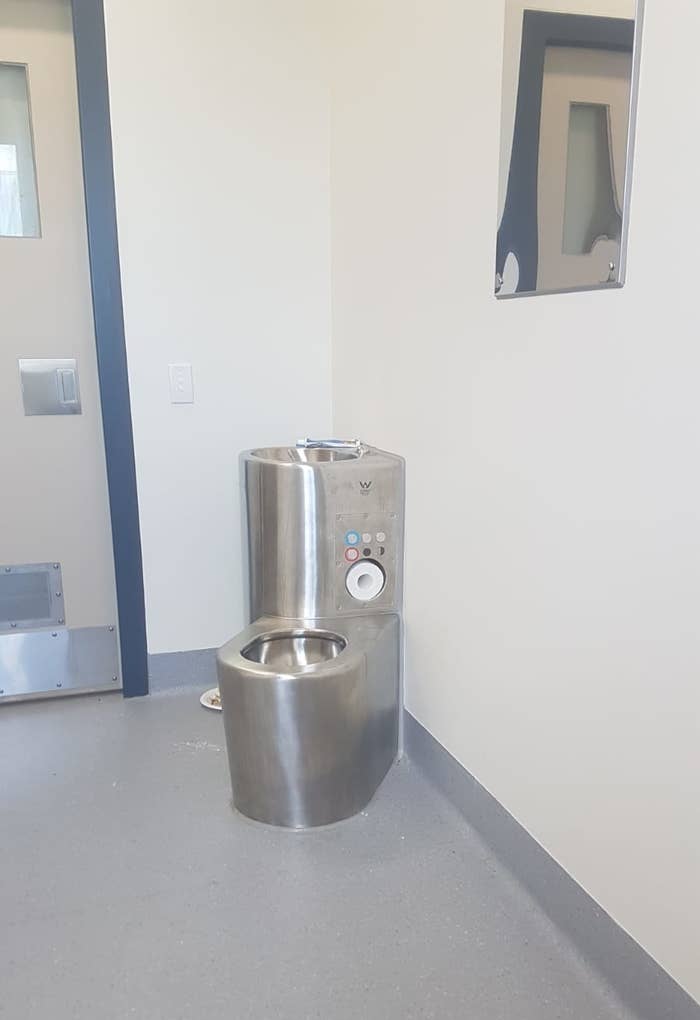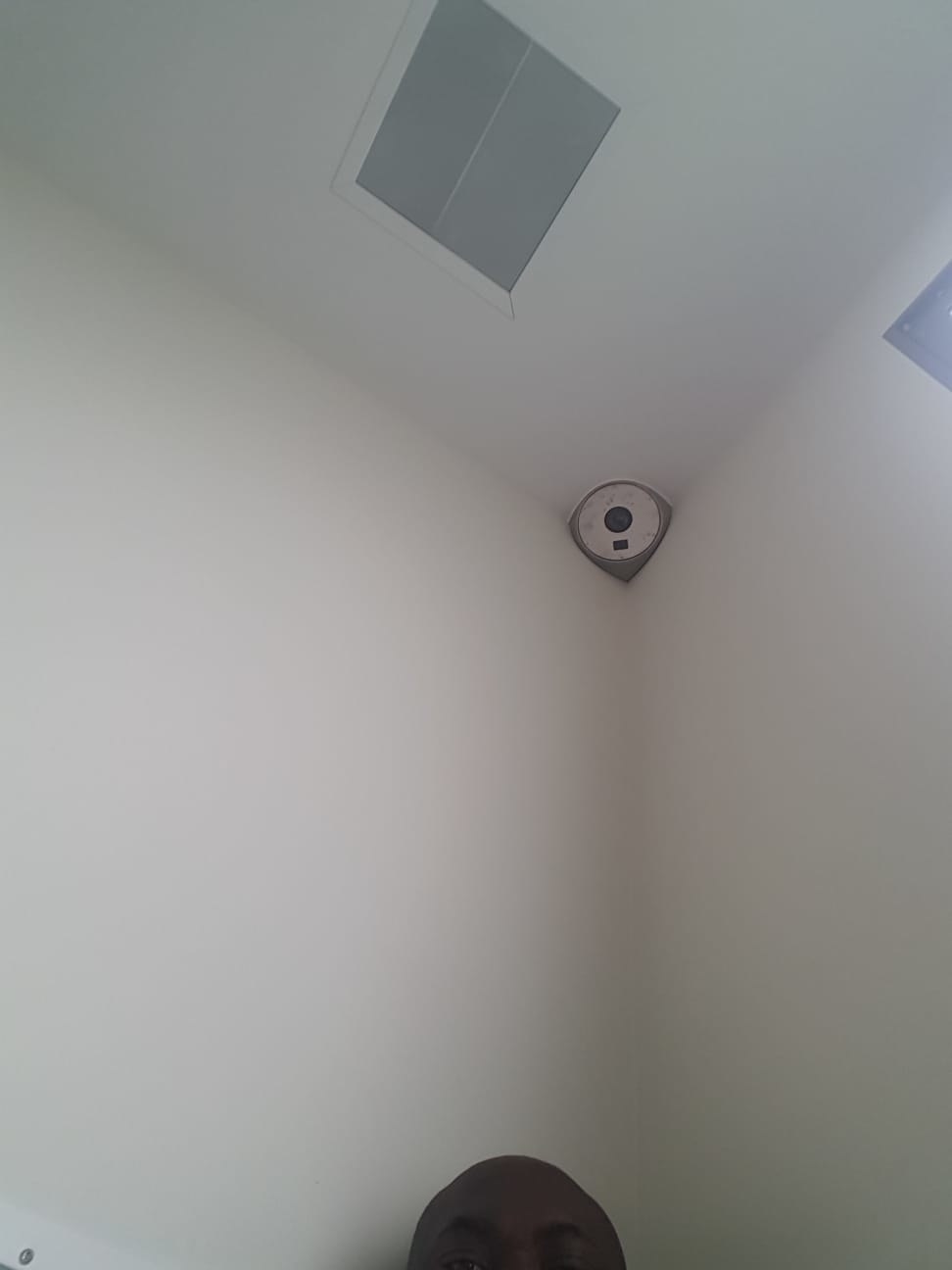
Since Saturday night, Edmond has not left the tiny room with just a bed, shower, toilet and sink.
The 38-year-old Cameroonian refugee had been getting back into exercise, doing big workout sessions over three days last week. By Saturday, his body was hurting all over. Amid Melbourne's cold weather, he had a little bit of pain in his throat and thought he might have a mild fever coming on.
So Edmond, who has been detained at the Melbourne Immigration Transit Accommodation (MITA) detention centre for the last eight months, asked a security guard for two Panadol.
The guard called a nurse, who asked him a few questions over the phone. The nurse then called her boss, who ordered Edmond into quarantine.
He was taken to MITA North, a high-security compound he had never been to before, and locked in the small room he is now very familiar with.
"I've never been in a jail, but the way they have built the room is like a jail," Edmond told BuzzFeed News by phone on Monday night. "Quarantine is not jail. Quarantine means they put you in isolation."
Guards pass his food in through a window in the door. He communicates to them by pressing a button on the wall. The shower is built into the room, with no door, curtain, or anywhere to put his towel. A window that looks outside was covered up on Monday morning. The sink, where he keeps his toothbrush, is built into the top of the toilet. A camera films him everywhere in the room, at all times.
"When I'm going to the toilet, the camera is in front of me," he said. "My privacy is out."
As the coronavirus pandemic has spread through Australia, the government has resisted loud calls to release immigration detainees. Its strategy instead is to prevent people from bringing the coronavirus into detention facilities, by banning visits, and to test and isolate any suspected cases. Edmond's experience shows just how cautious authorities are being.
A refugee from Cameroon spent almost three days in this small isolation cell after he asked a security guard at Melbourne's immigration detention centre for Panadol on Saturday night. He was released this morning after testing negative for COVID-19.
On Sunday morning, two nurses came and took his temperature and blood pressure, both of which were normal. They said he did not have symptoms and did not need to be tested for COVID-19, he said. But half an hour after they left, one returned and said her boss said he still needed to be tested. She took samples from his throat and nose on Sunday, he said, promising results in 24 hours.
But when another nurse came back the following day, he was surprised to learn that he was not being given a result. They did another test. Edmond said he had not been told why he did not get a result, and why he was tested again.
He has not been given any medication, not even the Panadol he originally asked for.
"When someone has symptoms of COVID-19, it's very dangerous for everyone, so they should care," Edmond said. But he does not understand why he has been placed in a tiny monitored cell, nor why he has had to wait so long for test results.
"I'm still waiting," he said. "It's very boring here. I have nothing, no contact with anyone." He has only his phone to entertain him, but he is not allowed a phone charger. A guard secretly charged his phone for 15 minutes, otherwise he would have run out of battery already.
In the meantime, he feels completely healthy.
"I don't have any cough. I don't have any fever. I don't have any flu. I don't have any throat problem," he said. He has been exercising in the room without any issues.
Finally, on Tuesday morning, Edmond got his result: he does not have COVID-19. When he spoke to BuzzFeed News again, he was still in the cell but about to be returned to his usual accommodation.

Alison Battisson, a lawyer for, and director of, Human Rights For All, said this is the fourth time she has heard of a detainee being held in these circumstances for a prolonged period in the last month.
"These are punishment cells, they are not isolation cells for health," Battisson told BuzzFeed News. "I think that raises severe questions about the legality of detention. ... There is no way to effectively manage an outbreak in a detention centre and I think they're playing Russian roulette."
Dr Barri Phatarfod, founder of Doctors For Refugees, told BuzzFeed News that Edmond's treatment was "not acceptable medical treatment for anyone", and Edmond should have seen a doctor by now.
"Solitary confinement has been used as a form of torture around the world. It is entirely inappropriate treat anyone but the most hardened and resistant criminal, which this man is clearly not."
Battisson added that harsh isolation conditions may deter people from reporting symptoms.
"If these individuals cannot be adequately treated during this viral pandemic in accordance with Australian standards then they need to be released, as countries around the world have done," Phatarfod said.
Edmond was brought to Australia to receive medical treatment for his back after spending six years detained on the island of Nauru. He said he doesn't usually complain, but chose to speak out this time because he was "so disappointed".
"This is a kind of torture. I'm already in a bad situation and they put me in the only place that's worse than the place I am. That is not fair," he said. "I'm not an animal, I'm a human being."
BuzzFeed News has contacted the Australian Border Force for comment.

